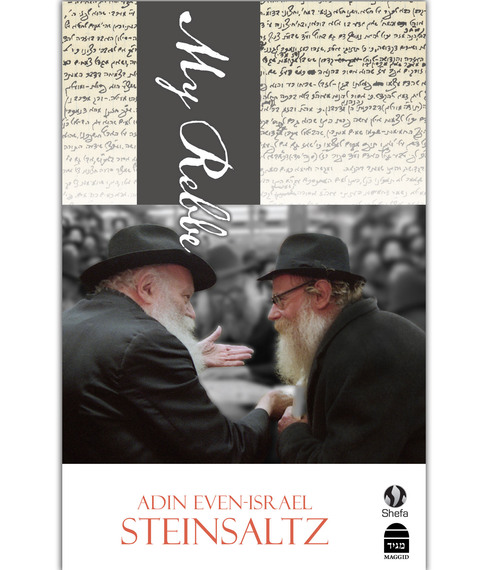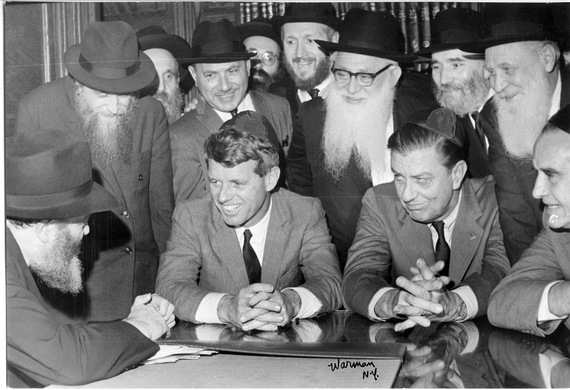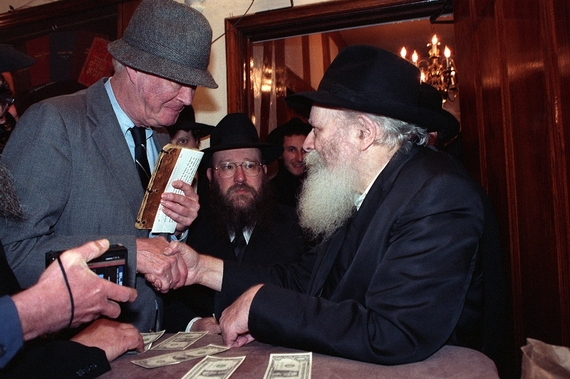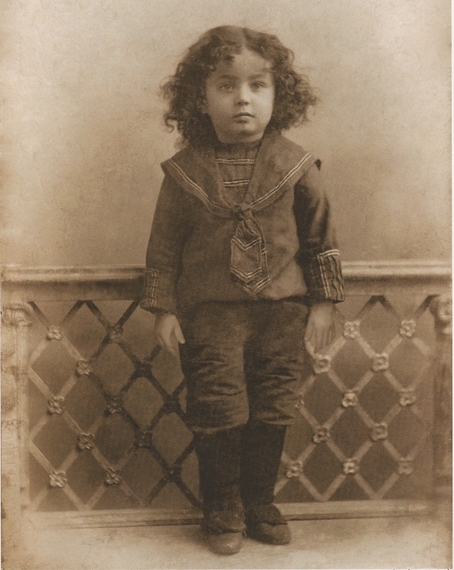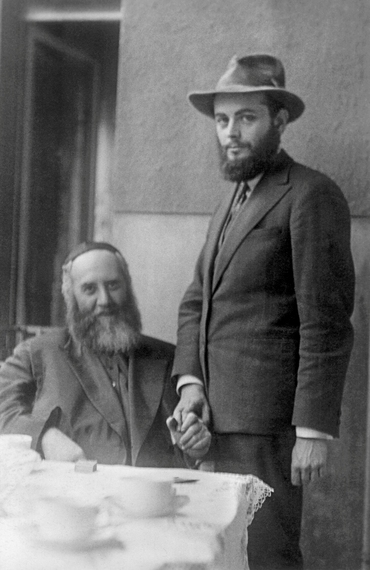The leading Jewish scholar in the world today, Rabbi Adin Steinsaltz, has written a book about Rabbi Menachem Mendel Schneerson, the late Lubavitcher Rebbe, who was the most influential rabbi of the 20th century. Such a combination of author and subject makes the publication of My Rebbe, in and of itself, an extraordinary Jewish literary event.
After all, in addition to writing over 60 books and teaching all over the world, Rabbi Steinsaltz has also done something in our generation that has not been achieved in 1000 years: he has translated and written a comprehensive commentary on the entire 63 volumes (over 6000 pages) of the Babylonian Talmud, the very cornerstone of all Jewish learning. Written in modern Hebrew and in the process of being translated into English, Spanish, Russian and French, Rabbi Steinsaltz's edition of the Talmud is considered a revolutionary work of genius. More Jews have access to the wisdom of the Talmud today than ever before -- due in large part to the work of Rabbi Steinsaltz.
And the Rebbe, Rabbi Menachem Mendel Schneerson, until his death in 1994, inspired, built, and led the profoundly influential Chasidic movement known as Lubavitch, with its worldwide network (1000 cities in 70 countries) of Jewish educational institutions, outreach-oriented Chabad Houses and the emissaries who lead them. The Rebbe was continuously sought after for advice by tens of thousands of people, including many world leaders, who came to his small office in Brooklyn, New York to meet with him. As Nobel Laureate Elie Wiesel once said, "I know of no one who has left the Rebbe, even after a moment of a private audience, without being deeply affected, if not changed, by their encounter."
The Rebbe's death did not slow down the Rebbe's influence. On the contrary, the numbers of people for whom the Rebbe's teachings have had an impact continues to grow throughout the world. But at the same time so many questions concerning the Rebbe also continue to circulate widely, both by the many who met him and the many more who did not.
There continues to be a lot of controversy and strong feelings on all sides regarding the Rebbe. Some of those who talk about the Rebbe often speak of his miracles; others have even made messianic claims about him. But on some things there is almost universal agreement: the Lubavitcher Rebbe, Rabbi Menachem Mendel Schneerson, was charismatic, brilliant, yet in many ways a mystery. In My Rebbe, one of its author's goals is to pierce the veil of those mysteries.
Full disclosure: Rabbi Adin Steinsaltz is my rebbe (spiritual mentor). In other words, My Rebbe by Rabbi Adin Steinsaltz is a book by my rebbe about his rebbe.
Perhaps, therefore, I should not have been so surprised when I read the very first paragraph of the book -- but I was. Rabbi Steinsaltz begins by recalling the first time he met the Lubavitcher Rebbe: "It seemed that he was attuned to a higher outlook", Rabbi Steinsaltz recalls. This was precisely my experience the first time I met Rabbi Steinsaltz in the 1970's.
Over the years I have often described many of my personal and theological conversations with Rabbi Steinsaltz as being "hot like fire", and there, in the first paragraph of My Rebbe, Rabbi Steinsaltz writes, "Many who stood in the Rebbe's presence came away feeling...marked by fire..."
Ever since I wrote my first letter to Rabbi Steinsaltz over 35 years ago, I have described it to so many people as a "love letter." And there, once again in the first paragraph of My Rebbe, Rabbi Steinsaltz says of his first meeting with the Lubavitcher Rebbe, "It was love at first sight."
Now it could be reasonable to assume that a book about the enigmatic Lubavitcher Rebbe, written by someone who confesses it was "love at first sight" would be a puff job, a hagiography. But three aspects of the book show it to be otherwise.
First, there is its author's reputation. Rabbi Adin Steinsaltz is a world class scholar, with a reputation for telling it like is -- about everything. His integrity is universally recognized by those who know him and know his work. His biography reads like a legend in the making.
Second, Rabbi Steinsaltz writes this book as an insider, with an insider's knowledge of the details -about the Rebbe, about Lubavitch, and about all the major players in the Lubavitch world. His information is never mere hearsay. Rabbi Steinsaltz seems always eager to examine and challenge the most basic assumptions without hesitation. Many things distinguish My Rebbe from other books published about the Lubavitcher Rebbe, not the least of which is simply that most of Rabbi Steinsaltz's career has been devoted, as an insider, to caring about those of us eager for clarity. Rabbi Steinsaltz has earned the right to speak as an authority.
Third and most important, Rabbi Steinsaltz deals with each and every controversy or mystery about the Rebbe head-on. It is worth mentioning that by including observations such as, "Even when the Rebbe's advice was followed, things still did not always work out well", in his book, Rabbi Steinsaltz is, as usual, a man with complete independence and lots of skepticism.
After the first chapter, called "What is a Holy Man?" in which he offers, with great eloquence, a magnificent statement about the qualities of an authentic Jewish sage, Rabbi Steinsaltz immediately confronts the most famous or infamous topic regarding the Rebbe: Could the Rebbe have been the Messiah? Is such a claim, by definition, an outrageous one? This book does not offer simple yes or no answers on any topic or question. As always, Rabbi Steinsaltz is interested in defining basic terms and examining the assumptions in the question itself, before digging more deeply into what it might mean.
Some of the questions spinning around for decades have had to do with the Rebbe's personal life before he became the Rebbe, as well as just how it was that Rabbi Schneerson came to become the seventh Lubavitch Rebbe. Rabbi Steinsaltz spends a chapter, "The Early Years" revealing many enlightening details about the Rebbe's personal history, and in the chapter "The Path to Religious Leadership," Rabbi Steinsaltz tells the story, in vivid detail, of the process through which Rabbi Menachem Mendel Schneerson became the Rebbe.
What about the claims of the Rebbe performing miracles? Rabbi Steinsaltz devotes a chapter, "Connection with the Divine" to the topic, including what it might mean to be a "seer." At one point Rabbi Steinsaltz writes, "A partial answer may be that (the seer) serves as a channel--sometimes consciously, sometimes not -- of a world beyond our daily reality, touching on the transcendent."
Perhaps the most dazzling chapter of all is the one titled "The World Beyond," in which Rabbi Steinsaltz explains and examines Jewish teachings on the soul after death, as well as the specific question concerning whether the Rebbe was able -- as it has been claimed -- to communicate with the deceased previous Lubavitcher Rebbe, who was the Rebbe's father-in-law. It is well known that the Rebbe would frequently, and sometimes for days in a row, visit the grave of Rebbe Yosef Yitzchak and spend hours there, reportedly in order to consult with his predecessor.
In My Rebbe, Rabbi Steinsaltz calls the Lubavitcher Rebbe "the greatest man I have ever met," which is precisely how I and many others say about Rabbi Steinsaltz. To quote the very first page of My Rebbe one last time, Rabbi Steinsaltz describes his Rebbe, Rabbi Menachem Mendel Schneerson, precisely the way I describe my rebbe, Rabbi Adin Even-Israel Steinsaltz:
"The life's work he chose constitutes one of the most remarkable religious tasks ever undertaken by a single man."
Arthur Kurzweil is the author of several books including On the Road with Rabbi Steinsaltz, The Torah for Dummies, Kabbalah for Dummies and Pebbles of Wisdom. For almost 20 years he was Editor-in-Chief of The Jewish Book Club.
All photographs from My Rebbe and used by permission of Jewish Educational Media.
